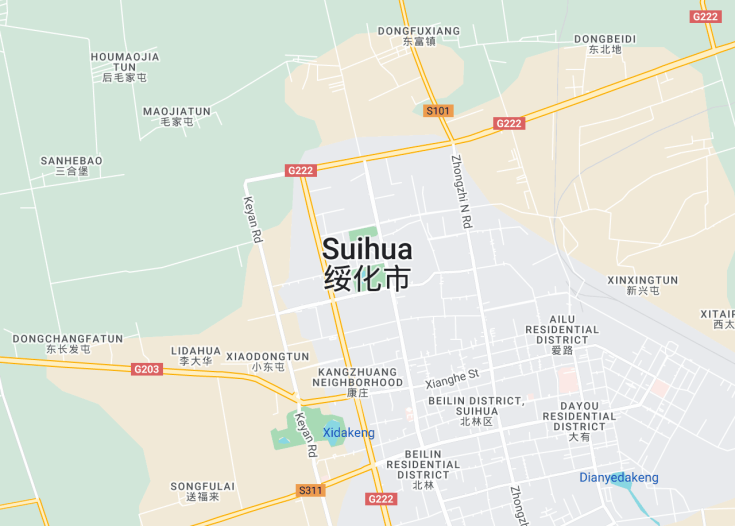Suihua, located in Heilongjiang province in northeastern China, is a remarkable destination that thrives despite its harsh, wintry climate. Known primarily for its agricultural significance, Suihua features vast landscapes, consisting of fertile black soil that sustains its primary industry. However, for travelers, Suihua offers a unique glimpse into rural Chinese culture, local culinary distinctiveness, and unexpected natural beauty marked by serene rivers and expansive plains. Its proximity to Harbin enhances its appeal, allowing visitors an easy route to experience the Ice Festival, illustrating a blend of natural charm and cultural vitality.
For an authentic local experience, visit during the harvest season to witness the bustling activity and traditional farming practices firsthand.
Method of transport in Suihua is limited; consider renting a car to fully explore the terrain and neighboring attractions comfortably.
Top things to do & see in Suihua
Select the following sights and activities to discover best tickets and tours available in Suihua.
Suihua: Gateway to the North
| Country | China |
| Time in Suihua | GMT+8 |
| Language spoken | Mandarin |
| Population | 5.85 million (source: National Bureau of Statistics of China, 2020) |
| Currency | Renminbi (¥, CNY) |
| Airports |
|
Suihua, located in Heilongjiang Province of China, possesses a rich agricultural history, proliferating mainly in grains and supporting diverse subsidiary activities. As a crucial hub in the northeast, it connects smaller towns and rural areas to major cities. Historically, Suihua has been applauded for its role during the significant periods in China, including the resistance against foreign invasions and its development post the reform era. Today, Suihua is recognized for its socio-economic development, enhancing quality of life and boosting local industries.
Where is Suihua?
Situated in the southwest of Heilongjiang Province, Suihua serves as a key agricultural and economic zone in northeast China.
Distances:
| Route | Distance by car | Time by car |
|---|---|---|
| Harbin to Suihua | 102 miles (165 km) | 2 hours |
| Beijing to Suihua | 697 miles (1122 km) | 12 hours |
What is Suihua famous for?
Suihua is particularly famous for its vast fertile plains that support a booming agricultural industry, crucial for supplying cereals across China.
History
Pre-History to Early Settlements (Before 1900)
The region that would come to be known as Suihua has been inhabited for thousands of years. Archaeological findings in the area indicate that ancient nomadic tribes used the area as hunting grounds. Over the centuries, it slowly transitioned into a settled area, with agriculture gradually becoming a dominant way of life due to the fertile soil and favorable climate.
The Qing Dynasty (1644-1912)
During the Qing Dynasty, Suihua’s importance grew significantly. The region was strategically important for the Qing rulers for its role in the defense against northern invaders and as a vital trade route. Several military posts were established, and the population began to grow as Han Chinese settlers moved into the area.
The Republic of China and the Early PRC (1912-1978)
With the fall of the Qing Dynasty, Suihua experienced several changes in administrative status and governance. During this period, the area witnessed significant events such as the Japanese occupation and the eventual liberation by the Communist forces. Post-1949, under the new People’s Republic of China, Suihua aimed at modernizing its agricultural practices, which significantly boosted its economy.
Contemporary Period (1978-Present)
In recent decades, Suihua has experienced rapid development. The city has expanded with new infrastructures such as roads, schools, and hospitals. The establishment of the High-Tech Development Zone has attracted various technology firms, diversifying its economy. Today, Suihua continues to develop as an important hub in Heilongjiang Province, blending its rich historical heritage with modern advancements.
Visit Suihua
What to see and do in Suihua
Exploring Suihua offers a mix of cultural, historical, and natural attractions. Visitors can explore the Suihua Museum to gain insights into the local history and culture. The nearby Zhaodong Mausoleum provides a historical tour highlighting ancient architecture. Nature enthusiasts will enjoy the Beilin Park, a perfect spot for leisure walks and witnessing the local flora. For those interested in winter sports, Suihua serves as a gateway to some of Heilongjiang’s famed ice festivals and skiing resorts.
Annual Events in Suihua
Suihua is vibrant with cultural events throughout the year. The Suihua Snow Festival, held in January, showcases stunning ice sculptures and winter sports. During the summer, the Suihua Agriculture Carnival celebrates the region’s farming heritage with exhibitions and interactive activities. These events offer a deep dive into the local culture and are spread through different periods of the year.
Best time to visit Suihua
For those planning to visit, the best times are during the spring and early summer months of May through July, when the weather is mild and the natural scenery is at its peak. Winter months offer the unique charm of snow activities and ice festivals, appealing to those who enjoy colder climates.
Is Suihua worth visiting?
Suihua offers a distinctive blend of historical richness, cultural events, and natural beauty, making it a worthwhile destination for those interested in exploring the diverse offerings of northeastern China.
While it may not boast the big-city allure of nearby Harbin, its quieter charm and less crowded attractions provide a more relaxed tourist experience. Potential visitors should be prepared for cold winters and relatively remote access. Nonetheless, for those intrigued by rural landscapes and regional heritage, Suihua presents a compelling case.










